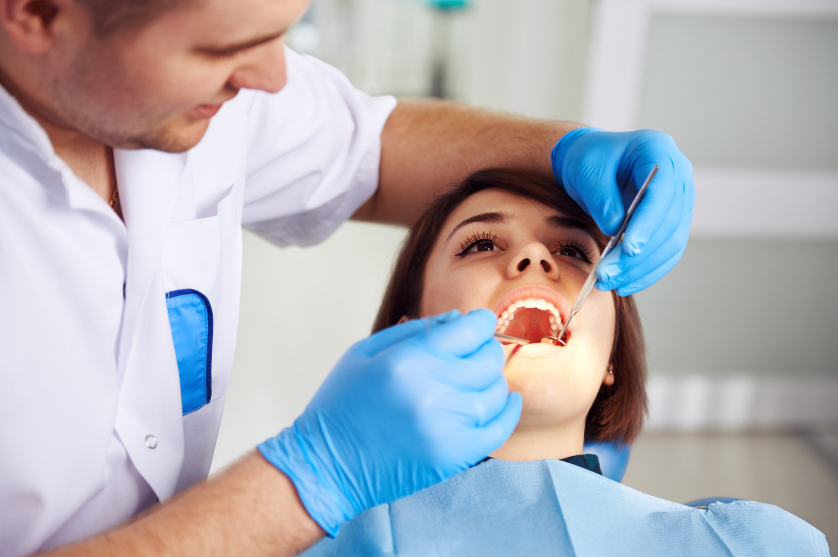When it comes to overall health, maintaining good oral hygiene plays a crucial role. Brushing and flossing are essential habits, with the American Dental Association recommending brushing your teeth twice a day and flossing daily. Lifestyle choices such as diet and smoking can have a significant impact on dental health. Foods high in sugar can contribute to tooth decay, while tobacco use is linked to gum disease and oral cancer. Properly caring for your teeth helps ensure not only a beautiful smile but also better overall health.
The Importance of Routine Dental Visits
Regular dental checkups are vital for catching problems like cavities, gum disease, or even oral cancer early on. Dentists can perform professional cleanings to remove plaque and tartar buildup and educate you on effective oral care practices. These visits are an opportunity for both diagnosis and prevention, helping you avoid more serious and costly treatments down the line. Early detection of dental issues leads to better treatment outcomes and lower expenses.
Effective At-Home Dental Care Tips
Maintaining your oral health at home is equally important as professional visits. Start by brushing your teeth properly with fluoride toothpaste and replacing your toothbrush every 3-4 months. Flossing daily and using mouthwash after brushing will help remove any remaining food particles and bacteria, giving your mouth a complete clean. A balanced diet also plays a key role in promoting healthy teeth.
Good brushing technique involves holding your toothbrush at a 45-degree angle to your gums and using short, gentle strokes. For flossing, gently slide the floss under the gum line and move it around the base of each tooth. Using the right tools, such as ADA-approved toothpaste and a soft-bristled toothbrush, will maximize your oral care routine. An antimicrobial mouthwash can provide added protection against plaque and cavities.
Diet’s Role in Dental Health
What you eat can directly affect your oral health. Foods high in sugar can lead to cavities, while crunchy fruits and vegetables can naturally clean your teeth. Dairy products, cheese, and leafy greens provide calcium and phosphates, which help strengthen your enamel.
A diet rich in calcium from sources like dairy and leafy greens can improve bone and tooth health. On the other hand, consuming acidic drinks like soda and citrus juices in moderation can protect your enamel from erosion. Drinking plenty of water is also essential as it helps wash away food particles, further reducing the risk of cavities and gum disease.
Identifying Dental Problems Early
Catching dental issues early can help prevent them from becoming more serious. Symptoms like bleeding gums, persistent bad breath, or tooth pain should prompt a visit to your dentist. Early intervention can be key to managing and treating conditions like gum disease before they worsen.
Routine checkups and cleanings are essential for identifying potential problems early on. For instance, mild enamel erosion can often be treated with fluoride applications, avoiding more invasive procedures like fillings or crowns later.
Being proactive about oral health by recognizing these warning signs can help you address problems before they escalate, ensuring better overall dental outcomes.
Choosing the Right Oral Care Products
Selecting the right oral care products is essential for maintaining good dental hygiene. Look for products that are approved by the American Dental Association (ADA) to ensure they meet safety and effectiveness standards. Your choice of toothbrush, toothpaste, floss, and mouthwash should prioritize quality and functionality.
Electric toothbrushes, dental floss, and antimicrobial mouthwash can enhance your daily routine. Electric toothbrushes, for example, often do a better job of removing plaque than manual brushes and typically feature timers to ensure you brush for the recommended two minutes. Dental floss, whether traditional string or interdental brushes, can reach areas between teeth that a toothbrush cannot clean.
Ongoing innovations in oral care products help improve the quality of dental hygiene. For example, newer mouthwashes offer additional benefits such as enamel strengthening or teeth whitening, allowing you to target specific oral health needs.
The Value of Professional Cleanings
Although regular brushing and flossing are crucial, they may not remove all plaque and tartar. Professional cleanings are necessary to eliminate buildup that your at-home care may miss. Routine cleanings can also help identify potential dental issues early, ensuring better overall dental health. These cleanings are not only important for maintaining gum health but also contribute to a brighter smile by removing surface stains.
Professional cleaning is tailored to each individual’s needs, going beyond what can be achieved at home. Hygienists use specialized tools to thoroughly clean your teeth and gums and check for any signs of problems. These visits can help identify issues before they become serious, allowing for more effective treatment.
The tools and expertise used in professional cleanings provide a level of thoroughness that is hard to match with home care alone. With regular cleanings and good at-home care, you can maintain a lifetime of healthy teeth and gums.
In conclusion, adopting a consistent dental care routine and staying on top of regular checkups can have lasting benefits for both your oral health and overall well-being. By following these tips, you can enjoy a healthier smile for years to come.

发表回复